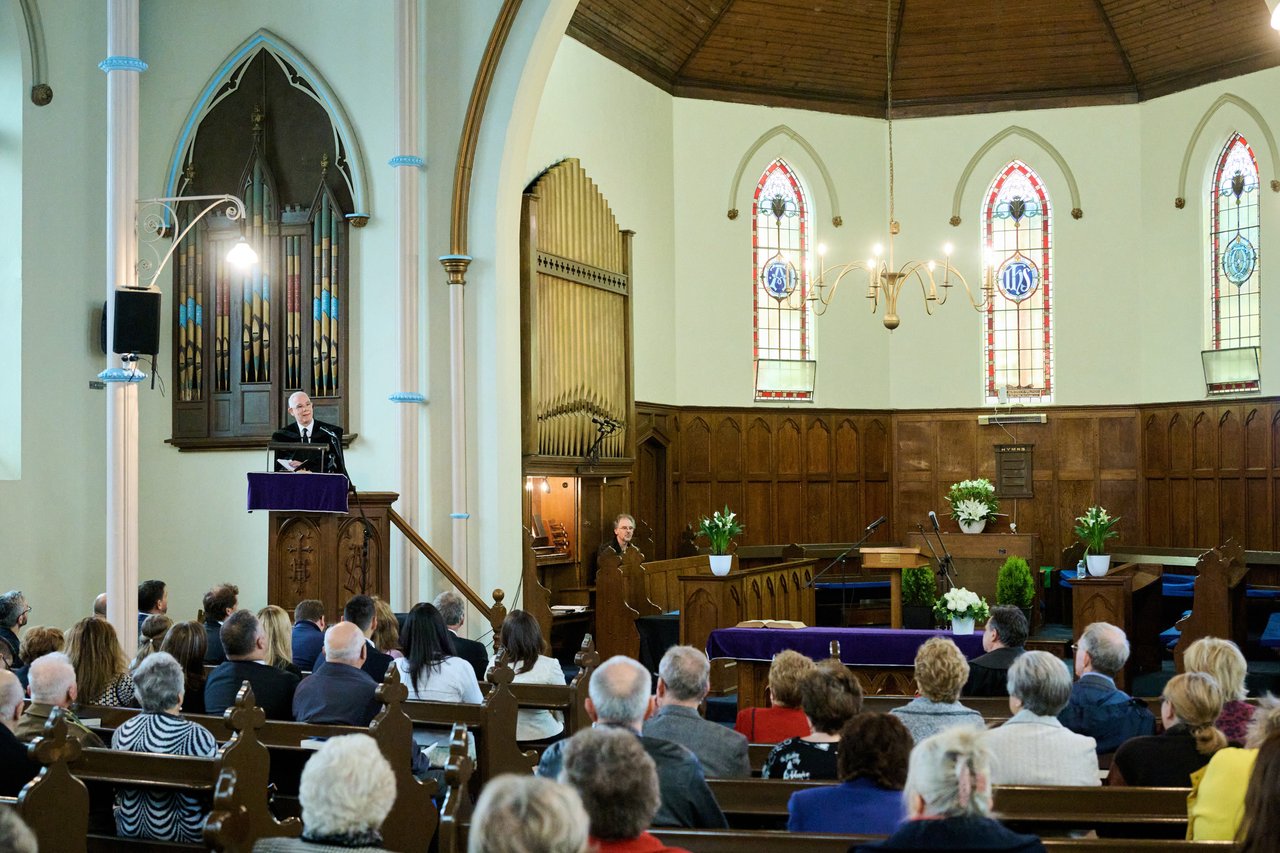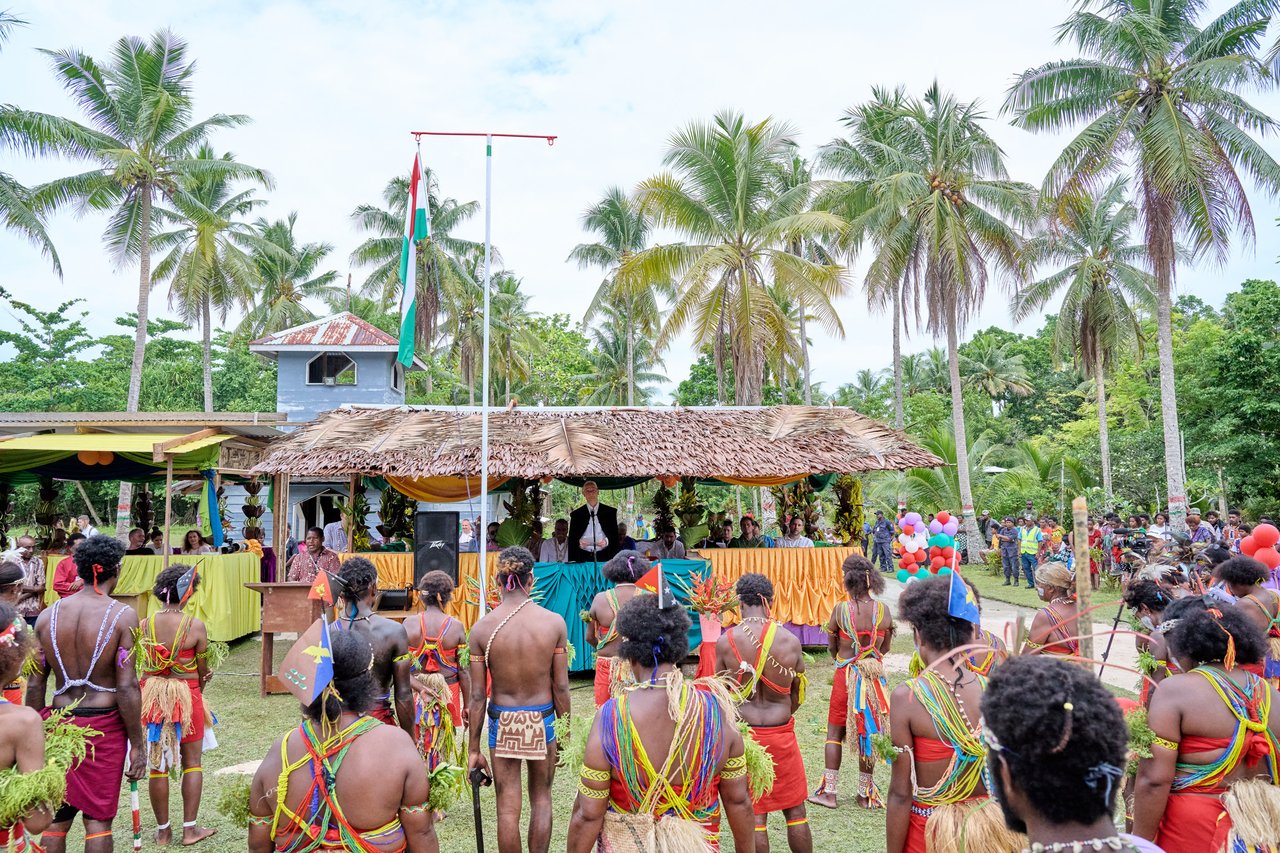In October 2023, Bishop Zoltán Balog, Ministerial President of the Synod, visited Australia and Papua New Guinea together with a delegation of the President of Hungary, Katalin Novák.
Visit to the Hungarian Reformed diaspora congregations in Australia

During his ten-day trip to Australia, Bishop Balog visited Hungarian Reformed congregations in several major cities in Australia. On October 22nd, the Ministerial President of the Synod preached in the Hungarian Reformed Congregation in Melbourne and spoke about the power of Christ and the Word in relation to community building. In his speech at the commemoration held on the occasion of the anniversary of the 1956 Hungarian Revolution, also held at the Hungarian Reformed Church in Melbourne on October 23rd, he stressed that freedom is a gift and that we all have a responsibility to achieve the order that comes from freedom. At the event, which was attended by Hungarian refugees and descendants of the 1956 revolution, he also highlighted the role of the community leaders.
In his service on the occasion of the consecration of the new Hungarian Reformed Church in Marsden, Bishop Balog pointed out that "for a building to become a temple of the Holy Spirit, it is necessary that those who go there take with them the Spirit of God, the love of God.” He read the warnings of Apostle Paul in his first letter to the Corinthians: "Do you not know that your body is the temple of the Holy Spirit in you, whom you have received from God, and therefore you are not your own? For you have sinned in price: therefore glorify God in your flesh" (1 Cor 6:19-20). He stressed that "it is not enough to wait for our own souls to arrive and our inner unity to be restored, we need the Spirit of God, because only in this way can this inner unity be established".
At the Hungarian-language service held in Sydney on October 31st to celebrate the Reformation, Bishop Zoltán Balog stressed that the essence of the Reformation is to return. It is a return to the source where nothing is said other than that God loves us and calls us to a personal relationship in Jesus Christ. Using Psalm 115 as the theme of his sermon, he called for a fight against idols. He said that three main idols remained the same in the 21st century: idols of power and violence, idols of fertility, and idols of wealth. He pointed out that every day of a Christian’s life is repentance from idols, since "idolatry is not only a temptation of the indigenous peoples but of all men." He stressed that facing idols should not fill us with shame since, in Jesus Christ, it actually frees us for a personal relationship with God. "Why does man not want all this? It is because in a personal relationship of love, there is vulnerability and unpredictability; anything can happen. If we unite with the God who loves us, anything good can come out of it, even things we don't think about. It's called a blessing," he said.
At the last stop of his trip to Australia, at the Hungarian Reformed Congregation in Adelaide, where he was the first bishop of the Hungarian Reformed Church to visit, Bishop Zoltán Balog pointed out in his sermon on November 2nd that Hungarians, even if they are scattered all over the world, try to stick together. At the same time, he stressed that "as Christians, the Word of God offers us a benefit that is even bigger than our Hungarianness. Our sometimes sad but wonderful history and culture binds us together, and we are proud of it. Yet it is the love of Jesus that truly gives us the strength to stand together."
New bell on the island of Pitilu: A visit to the martyred Hungarian Reformed missionary Mária Molnár on the island of Pitilu in Papua New Guinea

The visit to the Hungarian diaspora in Australia was complemented by a trip to Papua New Guinea. The members of the delegation of President Katalin Novák commemorated together with the local community the martyrdom of Mária Molnár, a Reformed missionary who served on the island of Maus and Pitilu in Papua New Guinea until her martyrdom in 1943.
The Hungarian delegation was solemnly welcomed by the islanders in front of the small wooden church on the small Pacific island, which is barely five kilometres long and a few hundred metres wide. The guests were greeted by Pastor Peter Sotil of Pitilu on behalf of the local Maria Molnar Foundation, after which schoolchildren sang the national anthem of Papua New Guinea and played a recording of the Hungarian national anthem.
The delegation took a new bell with them to Pitilu as a gift from the Hungarian Reformed Church to replace the bell that was a gift from Mária Molnár in 1937 but was later damaged in a typhoon. In his sermon, Zoltán Balog pointed out that "when the bell tolls, it reminds us of Mária Molnár and all those who have carried on God's call." He recalled that Mária Molnár did not want to leave Hungary, but she chose this path because when the Lord calls, we must go. "I would be terrified if God were looking for me on the Isle of Manus and I were in Budapest, but I am no less afraid if God were looking for me in Hungary and I were on the Isle of Manus,” Bishop Balog quoted the missionary, adding that there is nothing worse than not being where God has placed us. Speaking to the community of Pitilu, he said, "Thirteen thousand kilometres away, there are people, the people of Mária Molnar, the Hungarians, who are the people of Jesus Christ just like you. We want to be the people of Jesus Christ. We want to be in the place that God has prepared for us. We want to do what Jesus Christ wants us to do." He called on the celebrating congregation to "never forget Mária Molnár, the Hungarian missionary, never forget each other and never forget God's call to the place He has prepared for all of us."
During the festive service, the President of Hungary, Katalin Novák, addressed the participants. The Hungarian-Pitilu congregation prayed the Our Father in English and sang together. Zoltán Balog prayed for the blessing of all present, and then the bell on the covered pedestal next to the church was blessed and rung so that it could once again be the bell that calls the people of Pitilu to worship, just as the previous one during the life of Mária Molnár.
Mária Molnár: Hungarian Missionary and Martyr
Mária Molnár, born in 1886, was the most notable Hungarian missionary of the Reformed Church in Hungary. She used the knowledge she acquired as a voluntary nurse during World War I in her mission work on the Manus and Pityilu Islands, ultimately becoming a martyr during the Pacific theater of World War II.